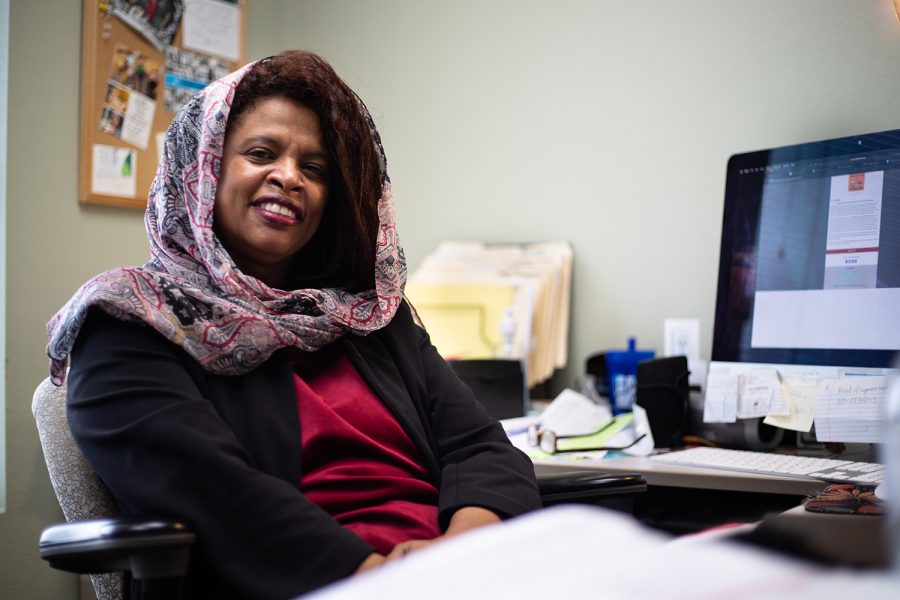Women in Leadership course uplifts female leaders worldwide
The new University of Iowa course encourages students to overcome barriers of gender equality.
Mazahir Salih poses for a portrait in her office at the Center for Worker Justice in Iowa City Monday, Oct. 11, 2021.
November 16, 2021
A majority of respondents to a survey by the Women’s Forum for the Economy & Society said that women have less access to leadership positions and equal salary levels, though they may have the same levels of experience or skills as men in the same positions.
A new course at the University of Iowa, Women in Leadership, aims to lessen these disparities and give students the tools necessary to hold leadership positions and uplift women who have excelled in leadership worldwide.
“I wanted us to take a look at the global state of affairs for women, and not just be confined to business — all leaders,” UI Adjunct Instructor Nancy Millice said.
The Women in Leadership course syllabus stated that the course will focus on “the exploration of obstacles and challenges experienced by women in leadership as students explore their own leadership, and how people of all genders can work to overcome these barriers toward gender equality.”
Millice created the course with new leaders in mind, she said.
“I don’t really want to teach a leadership class without including some type of leadership skills for the individuals taking the class,” Millice said.
The course includes texts from authors like Stacey Abrams, Julia Gillard, Ngozi Okonjo-Iweala, and Julie Owen. Projects and readings within the course allow students to research women in leadership of diverse backgrounds, some of whom weren’t on most people’s radars, Millice said.
She said only women took the first semester of the course, but the course is open to all students.
“I think it can be a safe place with men in it, as well, because one thing that we do highlight … is that men are part of the solution,” Millice said.
Mazahir Salih, executive director of the Center for Worker Justice of Eastern Iowa, said having women of color in leadership positions can be an inspiration for other women of color. But they need to be given the resources to succeed in those positions, she said.
“Give them the supporting tools so they can continue their job. And this is not only women in leadership — women in any workplace,” Salih said. “For example, at the government level, whether they are working for the county or for the city, whether they are leaders or something, they need to be given the supporting tool to retain them and let them continue.”
RELATED: New student organization wants more women in business
Other programs on campus assisting in the advancement of women include the Women in Business student organization and the Iowa Women’s Leadership Network alumni organization.
Cindy Roehr, Iowa Women’s Leadership Network president, said the organization, which was formed two-and-a-half years ago, was created to uplift UI alumni in their lives post-graduation.
“Its purpose is to try to unify the women that have graduated from the University of Iowa and help us to help each other to become better and stronger women in our careers, in our lives, and to help lift everybody up so that they can just have a better life,” Roehr said.
Roehr said diversifying perspectives within leadership is invaluable.
“I think it’s important to include everybody in the conversation because we all have different life experiences and we all have different challenges ahead of us,” Roehr said. “If you don’t know and understand those challenges and appreciate what people are going through you can’t help them to improve and make the world better.”
Cami Hunter, president of UI Women in Business, said the Women in Business organization works to uplift diverse perspectives by providing professional development, mentorship opportunities, and accessibility to a variety of resources.
Hunter said leadership should challenge the status quo while also creating a climate where those with differing experiences feel comfortable and respected.
“It kind of goes more into: How do we start fostering that or cultivating that respect and appreciation, rather than just saying ‘OK, well, we have a female leader,’” Hunter said. “We should also champion for her and respect her as a female leader, too. I think that’s where maybe there’s a lot of work to be done.”



